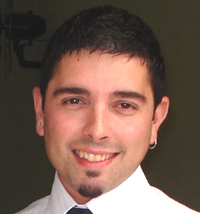Phiber Optik
| Mark Abene | |
|---|---|

Abene in July 2008.
|
|
| Born |
February 23, 1972 New York City, New York, U.S. |
| Residence | Silicon Valley, California, U.S. |
| Nationality | American |
| Other names | Phiber Optik |
| Occupation | Infosec expert, programmer, cryptographer, entrepreneur |
| Known for | Hacking, Phreaking, Infosec |
Mark T. Abene (born February 23, 1972), is an infosec expert and entrepreneur, originally from New York City. Better known by his pseudonym Phiber Optik, he was once a member of the hacker groups Legion of Doom and Masters of Deception.
Phiber Optik was a high-profile hacker in the 1980s and early 1990s, appearing in The New York Times, Harper's, Esquire, in debates and on television. He is an important figure in the 1995 non-fiction book Masters of Deception — The Gang that Ruled Cyberspace and appears in the 2016 Adam Curtis documentary HyperNormalisation.
Abene's first contact with computers was at around 9 years of age at a local department store, where he would often pass the time while his parents shopped. His first computer was a TRS-80 MC-10 with 4 kilobytes of RAM, a 32-column screen, no lower case, and a cassette tape recorder to load and save programs. As was customary at the time, the computer connected to a television set for use as a monitor. After receiving the gifts of a RAM upgrade (to 20K) and a 300 baud modem from his parents, he used his computer to access CompuServe and shortly after discovered the world of dialup BBSes via people he met on CompuServe's "CB simulator", the first nationwide online chat. On some of these BBSes, Abene discovered dialups and guest accounts to DEC minicomputers running the RSTS/E and TOPS-10 operating systems as part of the BOCES educational program in Long Island, New York. Accessing those DEC minicomputers he realized there was a programming environment that was much more powerful than that of his own home computer, and so he began taking books out of the library in order to learn the programming languages that were now available to him. This and the ability to remotely save and load back programs that would still be there the next time he logged in had a profound effect on Abene, who came to view his rather simple computer as a window into a much larger world.
...
Wikipedia
